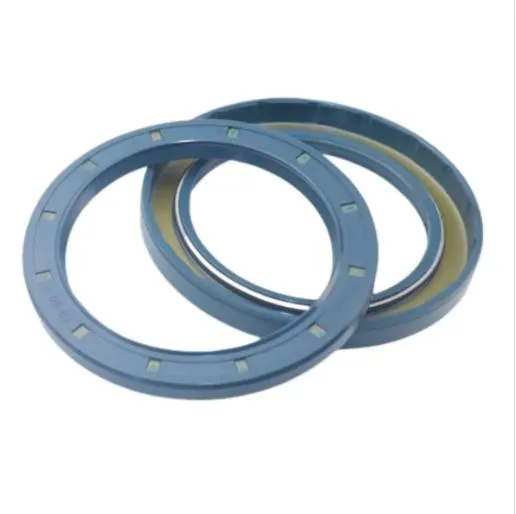ਨਵੰ. . 20, 2024 11:11 ਸੂਚੀ 'ਤੇ ਵਾਪਸ ਜਾਓ
Everything You Need to Know About TCV Oil Seals: A Practical Guide
When it comes to maintaining high-performing machinery, TCV oil seals are essential components that ensure the smooth operation of equipment. Designed to prevent leakage and protect vital mechanical parts from contamination, these seals play a crucial role in a wide range of applications. In this guide, we’ll dive into the importance of TCV oil seals, how they work, and why choosing the right TCV seal is key to long-term reliability and efficiency.

What is a TCV Oil Seal?
A TCV oil seal is a specialized component used to prevent the leakage of lubricants, oils, and other fluids in mechanical systems. It acts as a barrier between moving parts, ensuring that oil remains within the system and contaminants such as dirt, water, and dust are kept out. The effectiveness of a TCV oil seal is critical in maintaining the integrity of machinery, preventing damage that could lead to costly repairs or equipment downtime.
Commonly used in engines, pumps, and gearboxes, TCV oil seals are designed to handle high temperatures and pressures. They are essential in preventing wear and tear on machinery, as well as ensuring that components remain properly lubricated during operation.
How Does a TCV Seal Work?
A TCV seal functions by creating a tight, impermeable barrier between the rotating shaft and the housing of a machine. This seal keeps lubricating oil inside the system while keeping harmful external elements out. The precision with which a TCV seal is manufactured ensures that it can withstand the rotational forces and pressures exerted by mechanical components during operation.
The design of the TCV seal includes a flexible inner lip that fits snugly around the shaft, providing a tight seal while allowing for movement. This lip is usually made from materials that are resistant to oil, heat, and pressure, such as nitrile rubber or Viton. The outer shell of the seal is often made of metal or other durable materials to ensure a secure fit within the housing.
Benefits of Using TCV Oil Seals
There are several reasons why investing in high-quality TCV oil seals is important for the efficiency and longevity of your machinery. First and foremost, these seals prevent oil leaks, which can lead to significant mechanical issues if left unchecked. An oil leak not only affects the lubrication of moving parts but can also result in overheating, excessive friction, and premature failure of the equipment.
Another benefit of TCV oil seals is their ability to protect machinery from contaminants. Whether it’s dust, dirt, or moisture, external particles can cause corrosion and wear on internal components. By using a TCV oil seal, you can prevent these contaminants from entering the system, which helps maintain the overall health of your machinery.
Choosing the Right TCV Seal
Selecting the right TCV seal for your machinery involves considering several factors. First, it’s important to know the size of the seal required, which will depend on the shaft diameter and housing dimensions. A properly sized TCV seal ensures a secure fit and effective sealing.
Material choice is another crucial factor. Different applications may require different materials based on the temperature, pressure, and types of fluids being sealed. For example, nitrile rubber is a common material used in TCV seals due to its resistance to petroleum-based oils, while Viton is preferred in high-temperature environments.
Additionally, it’s important to choose a TCV seal that can handle the specific operating conditions of your machinery. If the equipment operates at high speeds or under high pressure, a more robust seal design may be necessary to withstand the increased stresses and maintain performance.
Maintenance Tips for Extending the Life of TCV Oil Seals
While TCV oil seals are designed for durability, regular maintenance is key to extending their lifespan and ensuring they continue to function effectively. One of the most important steps in maintaining a TCV oil seal is regularly inspecting it for signs of wear, such as cracking, hardening, or deformation. Replacing a worn seal before it fails completely can prevent costly repairs and equipment downtime.
It’s also important to ensure that the seal and surrounding components are kept clean. Dirt and debris can cause abrasion on the seal’s surface, which may lead to premature failure. Additionally, using the correct lubricant and ensuring it is free from contaminants can help maintain the seal’s integrity over time.
In conclusion, TCV oil seals are vital components that contribute to the smooth operation and longevity of mechanical systems. From preventing leaks to keeping contaminants at bay, choosing the right TCV seal can make a significant difference in the performance and reliability of your machinery. By selecting high-quality seals and performing regular maintenance, you can ensure that your equipment remains efficient and protected for years to come.
-
TCN Oil Seal Metal Ring Reinforcement for Heavy Machinery
ਖ਼ਬਰਾਂJul.25,2025
-
Rotary Lip Seal Spring-Loaded Design for High-Speed Applications
ਖ਼ਬਰਾਂJul.25,2025
-
Hydraulic Cylinder Seals Polyurethane Material for High-Impact Jobs
ਖ਼ਬਰਾਂJul.25,2025
-
High Pressure Oil Seal Polyurethane Coating Wear Resistance
ਖ਼ਬਰਾਂJul.25,2025
-
Dust Proof Seal Double Lip Design for Construction Equipment
ਖ਼ਬਰਾਂJul.25,2025
-
Hub Seal Polyurethane Wear Resistance in Agricultural Vehicles
ਖ਼ਬਰਾਂJul.25,2025
-
The Trans-formative Journey of Wheel Hub Oil Seals
ਖ਼ਬਰਾਂJun.06,2025
ਉਤਪਾਦਾਂ ਦੀਆਂ ਸ਼੍ਰੇਣੀਆਂ
















